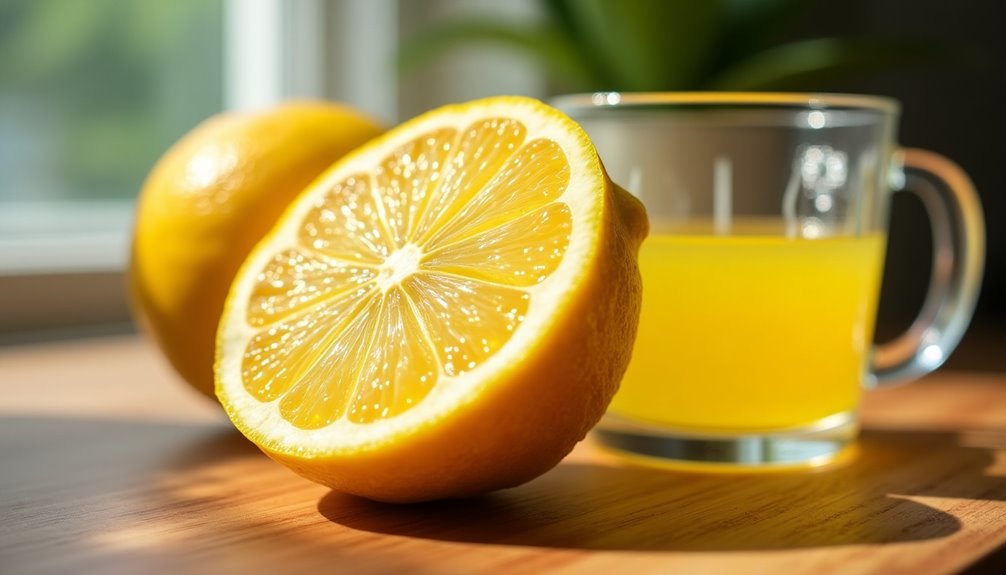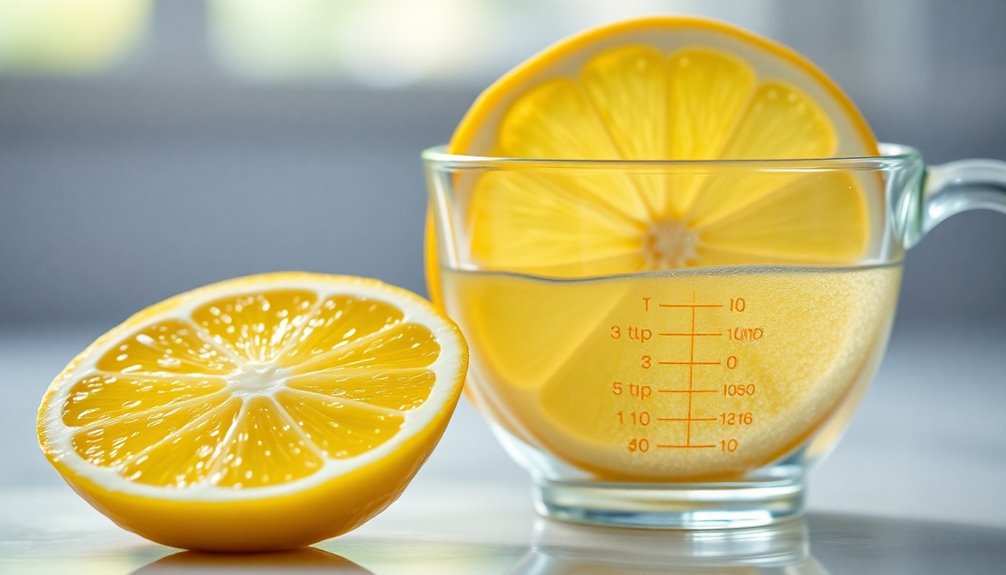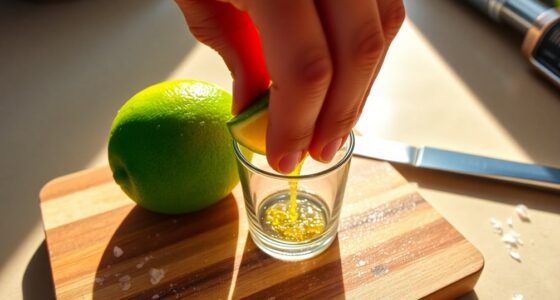A medium lemon usually gives you about 3 tablespoons of juice, while a large lemon can squeeze out up to 4 tablespoons. If you've got a small lemon, expect around 2 tablespoons. This variation in yield helps when you're planning recipes. Knowing the size of the lemon you have on hand can save you time and prevent buying too many. Stick around, and you'll learn more tips on how to make the most of your lemons!
Key Takeaways
- A medium lemon yields about 3 tablespoons of juice.
- A large lemon can produce up to 4 tablespoons (1/4 cup) of juice.
- A small lemon typically yields around 2 tablespoons of juice.
- Juice yield may vary based on the lemon's ripeness and freshness.
- Freshly squeezed lemon juice is preferred for its superior flavor and quality.

When you're squeezing a lemon, you can expect to get about 3 tablespoons of juice from a medium-sized fruit. If you're wondering how much juice you'll get from different sizes of lemons, it can really vary. A large lemon can produce up to 4 tablespoons, which is a quarter cup of juice. On the flip side, a small lemon usually yields around 2 tablespoons.
So, if you're planning a recipe that calls for lemon juice, knowing the size of your lemon can help you estimate how much juice you'll need.
Let’s say you’re preparing a dish that requires a cup of lemon juice. You’ll need about 5 to 6 medium lemons to hit that one-cup mark. This calculation can be handy when you’re shopping or if you’re trying to decide how many lemons to buy for your next culinary adventure. Additionally, always keep in mind that the juiciness of lemons can vary, so it’s wise to have a couple of extra lemons on hand just in case. This lemon juice measurement equivalence can be particularly useful when you’re scaling a recipe up or down. Remember, fresh lemon juice not only enhances the flavor of your dishes but also adds a vibrant freshness that’s hard to replicate with bottled alternatives.
It's also worth noting that if you just need a bit of juice, half of a medium lemon will give you approximately 1.5 tablespoons, which can be perfect for smaller recipes or dressings.
The amount of juice you get from a lemon can fluctuate based on factors like the lemon's ripeness and even the season. Some lemons might be juicier than others due to varying environmental conditions.
So, if you've got a particularly luscious lemon, you might get more juice than expected. Conversely, if a lemon's been hanging around for a while, it might be drier, yielding less juice.
In addition to the juice, don't forget about lemon zest! The zest can add a bright burst of flavor to your recipes, and you can often take it from the same lemon you're juicing. It's a great way to maximize the use of the fruit.
When zesting, just be careful to avoid the bitter white pith underneath the skin.
If you're experimenting with different recipes, keep in mind that the freshness of your lemon juice can really impact the final dish. Freshly squeezed lemon juice is often far superior to the bottled stuff, both in flavor and in nutritional value.
Frequently Asked Questions
How Much of Bottled Lemon Juice Is Equal to 1 Lemon?
When you're looking to substitute bottled lemon juice for fresh, you'll find that 2 tablespoons of bottled lemon juice typically equals the juice of one medium lemon.
However, keep in mind that bottled lemon juice can have a more concentrated flavor, so adjusting for taste is crucial. If you're uncertain, start with 1 tablespoon and taste-test before adding more.
Always check the label for any added preservatives that might alter the flavor.
How Much Juice for 1 Lemon?
When you ask how much juice you can get from one lemon, it really depends on the size. A medium lemon usually gives you about 3 tablespoons, while a large one can yield up to 4 tablespoons.
If you're using a smaller lemon, you might only get around 2 tablespoons. To maximize juice, try rolling the lemon on the countertop or microwaving it for a few seconds before juicing.
How Much Are 2 Lemons Worth of Juice?
When you're wondering about the wonderful yield of two lemons, you've got a juicy journey ahead!
Typically, two medium lemons squeeze out around 6 tablespoons, about 1/4 cup of bright, zesty juice.
If you opt for larger lemons, you might get up to 8 tablespoons, or 1/2 cup.
Can I Substitute Bottled Lemon Juice for Fresh Lemon Juice?
Yes, you can substitute bottled lemon juice for fresh lemon juice, but keep in mind that the flavor mightn't be as bright.
Generally, 1 tablespoon of bottled juice equals the juice of half a medium lemon. For a recipe calling for the juice of 1 medium lemon, use about 3 tablespoons of bottled juice.
Always check the label for concentration, and adjust the amount to suit your taste preferences.
Conclusion
In the grand orchard of your kitchen, one lemon yields about two to three tablespoons of bright, tangy juice, like liquid sunshine squeezed from nature's hand. So, when you slice into that yellow treasure, imagine the zest of summer bursting forth, ready to elevate your dishes. Whether you're drizzling it over a salad or mixing a refreshing drink, that vibrant juice will dance through your creations, transforming the ordinary into a citrus symphony.
Cindy thoroughly researches juicing trends, techniques, and recipes to provide readers with practical advice and inspiration. Her writing style is accessible, engaging, and designed to make complex concepts easy to understand. Cindy’s dedication to promoting the advantages of juicing shines through her work, empowering readers to make positive changes in their lives through the simple act of juicing.

















